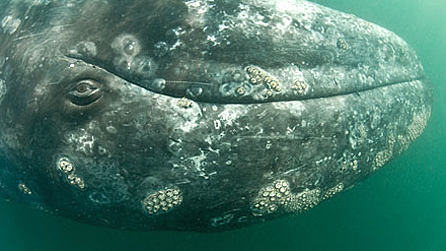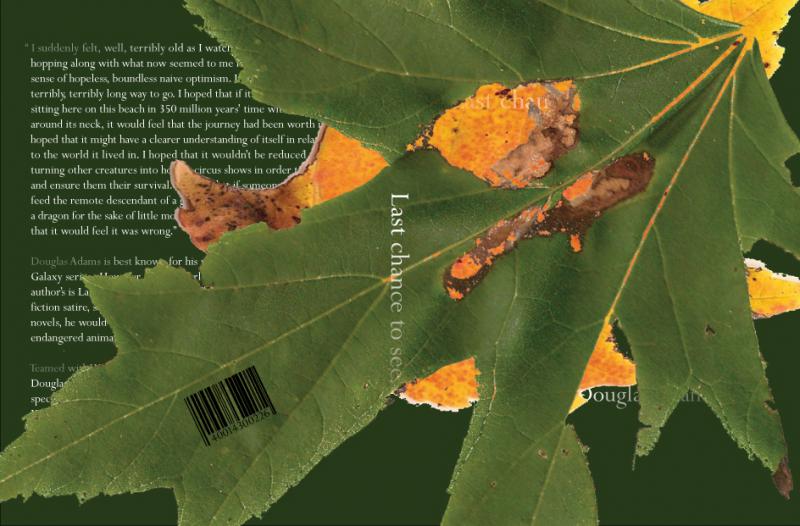Serendip is an independent site partnering with faculty at multiple colleges and universities around the world. Happy exploring!
"Last Chance to See"


An extract from Last Chance to See....
Writing two months after this class ended...
Certainly the most memorable event that took place, for me, during the course of this past semester, was Paul's lecture on "endlessness"--his urging us to find immortality in the persistence of thought ("I will not die"). I thought of that lecture again this morning, when I came across an article by Ursula Heise, called "Lost Dogs, Last Birds, and Listed Species: Cultures of Extinction," Configurations 18 (2010): 49-72, which looks at the elegaic, tragic story templates conventionally used to give accounts of the decline of particular species--and then explores an alternative, comedic narrative template that approaches extinction in the context of evolution, contingency, and experiment.
i think the deepest-and-broadest story Paul ever told -- and he told it repeatedly -- was about the possibility of always telling "a different story." I think that's one of his tales that I, too, have taken deeply to heart, and tried to apply during dark times ("there's got to be another way to tell this story").
Amazingly, Heise's essay does this w/ environmentalist discourse, which, she argues,
"has found it difficult to envision biodiversity loss outside the genre registers of elegy and tragedy, in terms that would enable the imagination not so much of the end of nature as its future. It may be interesting to remember, in this context, that one of the first critical works to engage questions of ecology and literary form, Joseph Meeker's The Comedy of Survival (1974), argues that tragedy, with its focus on the irreversible fall of a human being, has an inherently anthropocentric bias, whereas comedy, with its emphasis on regeneration, the passage from one generation to the next, and more generally on playful behavior that Meeker considers part of human's evolutionary heritage, relies on a more ecological architecture: 'Comedy is a celebration, a ritual renewal of biological welfare....Literary comedy depends on the loss of equilibrium and its recovery. Wherever the normal processes of life are obstructed unnecessarily, the comic way seeks to return to normal'....Meeker's claim...raises the question whether a comic narrative about species extinction might be possible.
Models of such an alternative mode of storytelling are not easy to come by, but at least one book on extinction manages to convey its conservationist substance in a comic rather than an elegiac mode: Douglas Adams and Mark Carwardine's Last Chance to See (1990), a collaboration between the author of the science-fiction comedy The Hitchhiker's Guide to the Galaxy and a zoologist....Seen through [Adams'] eyes, much of the human world is unpredictable, hard to understand, even harder to control, and completely irrational. So is the natural world, which presents itself to him as persistently surprising, bizarre, dangerous, beautiful, different, and difficult to account for in rational terms....Adams wonders how certain species ever managed to survive....and foregrounds the spectacular lack of adaptation in human and nonhuman behavior alike.
It is precisely this inefficient, irrational unadaptedness of the natural world that makes it attractive and worth preserving for the narrator--the sheer unlikelihood of it ever having made it to the present day in the first place....the conservationist message in Last Chance to See ultimately relies...on an essentially comic awareness of the utterly contingent events, habits and bodies it took to produce both humans and nonhumans in their present forms.....Last Chance to See implies a view of nature and culture as parallel and intersecting histories of experiments that continually succeed and fail...the failure of one experiment also becomes the point of a departure for new ones...the imperative to conserve biodiversity ...derives from a human commitment to value biological otherness. In this way Last Chance to See points to an understanding of extinction not only as narrative endpoint, but as the possibility of new beginnings--not the end of nature so much as its continually changing futures."
Or, speaking generically--in terms of genre--as Carol Burnett said, "comedy is tragedy, plus time."




Comments
Post new comment